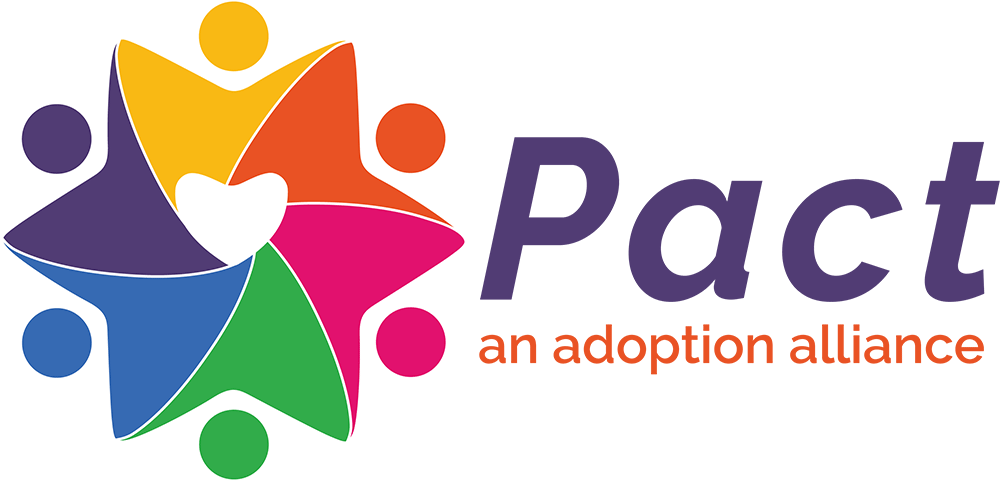Book Review:
Parenting as Adoptees
edited by Adam Chau and Devin Ost-Vollmers
reviewed by Marie-Claude Provencher
2013
My oldest and youngest children were both adopted, while my middle one was born to our family. As they are getting older, I have started wondering about how they will form their own families. Throughout the years they have said they will adopt, will parent kids born to them, or will do both, just like we have in our family.
Parenting as Adoptees (CQT Media & Publishing, 2012) is a collection of essays about how 14 adoptees have experienced becoming parents. While some of the voices were familiar (I have heard four of the contributors–John Raible, Susan Branco Alvarado, S. Kripa Cooper-Lewter, and JaeRan Kim–speak at Pact Family Camp), this book was eye-opening for me. It gave me a preview of what my children might experience, preparing me to be a better ally to them.
The contributors, all adult adoptees, formed their families in a variety of ways: some are in two-parent families, some are single parents; some have adopted transnationally, domestically, or through the foster-care system; others are parenting children born to them. Despite these differences, some common themes emerge from their parenting experiences. Two key threads run throughout the book: the impact of loss, and the importance of advocacy.
All the losses associated with adoption add to the challenges of parenting for adoptees. Becoming a parent brings wounds caused by these losses closer to the surface. All adoptees deal differently with the challenge, and in this book all of them reflect thoughtfully on how adoption transformed their parenting experiences.
Different parents experience different types of loss. Not all adoptees have photos of themselves as infants and babies, especially those adopted transnationally. Seeing a child with features they share seems to fill in some missing information. It is also soothing to finally share common traits with someone in the family. Some adoptees take thousands of photos to document their children’s first years, or feel like they have to be “super parents.” They are keenly aware of how important the early months of caring for an infant are, especially as they relate to attachment.
Because of the loss of their culture of birth, some adoptees struggle with how to give their child a sense of belonging in a culture they are still trying to feel part of themselves. Becoming parents makes them keenly aware of the lack of information about their own mother’s pregnancy and their birth history. Some writers felt inadequate, not worthy, or not ready to become parents. How could they become parents when their first set of parents did not parent them? Some simply could not bond with their babies at first and had to practice their nurturing skills by copying what they saw other parents do. Some avoided talking to their adoptive parents, who served as painful reminders of all the unknowns about their own gestation and birth. Some even felt jealous of their own kids because they were receiving what they never had: a pregnancy and birth story.
Having re-visited the sense of loss stirred up by becoming parents, many of the essayists conclude that their children have helped them heal. Being able to give to their kids what they never got has been beneficial. They show remarkable resilience–what Susan Branco Alvarado calls the “survivor brain.” Sandy White Hawk writes about how she learned to attach to her child by mimicking what her friend was doing until she “got” it. For others, becoming parents allowed them to embrace their birth culture in a more authentic way so their children would not feel alienated, as they were themselves.
The second common thread is the advocacy the writers practice. Because they were adopted they knew, without being told or taught, how to become an advocate for and ally to their children, fostering a sense of belonging, identity, and knowledge of culture and heritage. They are clear about the need to be social justice activists. They talk to their kids about race, racism, and other “isms” often. They talk about adultism and how adoption agencies and adoptive parents hold the power in the adoption industry. They understand that it is important for their kids to know hard truths. Essays from John Raible, JaeRan Kim, and Mark Hagland give specific advice for adoptive parents of children of color: forget about colorblindness, get the perspective of as many adult adoptees as possible, talk about racism and stereotypes, live in a diverse environment, attend events representing your child birth heritage, become friends with people who look like your child, and practice anti-oppression all the time.
Taken all together, the essays in Parenting as Adoptees tell a story of loss and resilience. And is that not the life story of our adopted kids? This collection of essays made me realize more than ever how adoption is a lifelong experience. Our decision to adopt our kids not only altered our children’s sense of identity and belonging, it will also affect their relationship with life partners, the way they parent, and the shape of our grandchildren’s reality.
Marie-Claude Provencher is an adoptive parent and has been a member of the Pact community for many years.
